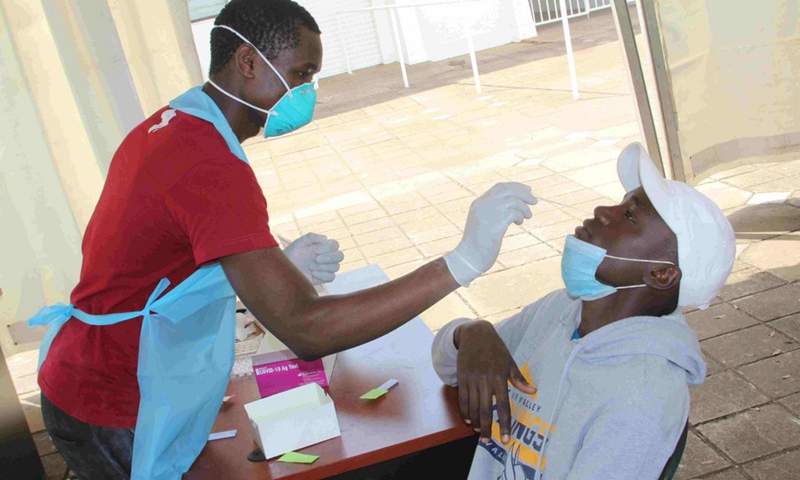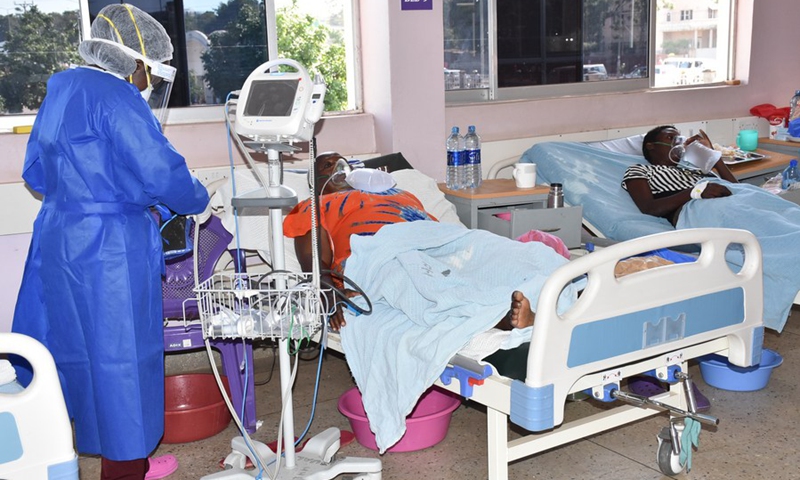
A sports participant (R) gets tested for the COVID-19 virus before being allowed to the event's venue at Moi International Sports Centre in Nairobi, capital of Kenya, on July 2, 2021.(Photo: Xinhua)

A nurse goes about her work at an isolation ward for COVID-19 patients at Jaramogi Oginga Odinga Teaching and Referral Hospital (JOOTRH) in Kisumu County, Kenya, on June 15, 2021.(Photo: Xinhua)
Kenya's COVID-19 cases have been on a rising trajectory in recent days, squashing any hopes of defeating the disease in totality.
The surging positivity rate is now threatening to trigger yet another wave of infections, just when Kenyans thought the pandemic was over following modest confirmed cases in the preceding months.
In light of this possibility, the population finds itself falling back on the good old body hygiene and physical distance recommendations to control the disease.
"I thought we were on our way to subdue the disease because the numbers had come down. Myself, I got rid of my washing station as I assumed people did not need to observe hand hygiene anymore. But the station is back up with the current scenario," Jane Njue, a food vendor in downtown Nairobi told Xinhua on Saturday.
Njue's previous assessment of the COVID-19 situation is shared by many other Kenyans, who similarly had started to treat preventive measures with laxity. But now, the threat of another wave is snapping them out of their complacency.
The ministry of health last week raised the alarm on rising cases painting a grim picture of fully occupied intensive care unit (ICU) beds in major hospitals in the county of Nairobi.
"As today (Aug. 6) Nairobi hospitals are stretched to a limit and the truth of the matter is that if you fall sick today within this county, you are very unlikely to get a bed. Unless we can contain the transmission at this level our health care systems may be overwhelmed," said Mutahi Kagwe, Cabinet Secretary in the Ministry of Health.
After a lull of a month or so since its last wave, positive cases climbed swiftly in August with the ministry recording upwards of 1,000 cases every single day. In July, positive cases were oscillating between 300-500 for the first week.
In some estates in the capital, ingeniously crafted washing points are making a comeback, proper masking is being witnessed and fists bumps have been revived.
Further, smaller businesses are putting up posters to declare their position on mobile payment to avoid hard cash transactions.
Away from the residential suburbs and into the bustling central business district and the guard is back up.
Supermarket's automatic dispensers that had ceased working are back to dispensing soap while fresh social distancing floor stickers have been deployed in some eateries and stores.
"Kenyans should be cautious of the imminent danger of another wave, some get upset when we ask them to sanitize before they walk in. This should not be the case," said Ahmed, a guard at a major retail outlet.
For Lucy Wairimu, an agronomist based in the capital, the threat is all so real to ignore after she contracted the disease early this year.
"I don't joke with that disease, let me just put it that way. People who have not had it may downplay the havoc it has on the body but as for me I do my best to stay clear of contracting it again," said Wairimu.
The virulent Delta variant which is now the dominant mutant in the county has been singled out by the ministry of health as one fueling the new cases.
The first case of the variant was detected in May in western Kenyan city of Kisumu.
While there is a sustained call to go back to the measures that have proven solid in the fight against COVID-19, election campaigns are threatening to scuttle these efforts.
Kenya is set to hold its general elections next year as provided by the constitution and as such leaders are touring the country selling their manifestos in turn pulling large crowds.
Public gatherings have been prohibited in the existing set of restrictive measures but that has done very little to deter leaders from moving around the country.
Meanwhile, in its war against the disease, the country is on course with vaccine deployment having administered over one million first doses of AstraZeneca vaccine.
The country expects a large consignment of Johnson and Johnson vaccines this month which will greatly boost the vaccination effort and drive Kenya an inch closer to meeting its goal of vaccinating the entire adult population of 26 million by the end of 2022.
